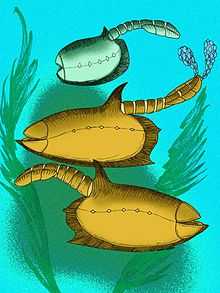Vetulicola
| Vetulicola Temporal range: Cambrian Stage 3 | |
|---|---|
 | |
| Vetulicola rectangulata and V. cuneata | |
| Scientific classification | |
| Kingdom: | Animalia |
| Superphylum: | Deuterostomia |
| Phylum: | Vetulicolia Shu, et al. 2001 |
| Family: | Vetulicolidae |
| Genus: | Vetulicola |
| Type species | |
| Vetulicola cuneata (Hou, 1987) | |
| Species | |
| |
Vetulicola is a genus of small, Early Cambrian animals from the Chengjiang biota of China.
Description
The type species, Vetulicola cuneata (Hou, 1987) has a body composed of two distinct parts of approximately equal length. The front part is rectangular with a carapace-like structure of four rigid cuticular plates, with a large mouth at the front end. The posterior section is slender, strongly cuticularised and placed dorsally. Paired openings connecting the pharynx to the outside run down the sides. These features are interpreted as possible primitive gill slits. Vetulicola cuneata could be up to 9 cm long. The Vetulicola are thought to have been swimmers that were either filter feeders or detritivores.
Other Vetulicola species described are Vetulicola rectangulata (Luo & Hou, 1999), V. gantoucunensis (Luo et al., 2005) and V. monile (Aldridge, Hou, Siveter, Siberet and Gabbott, 2007). The mouth openings of all the other species are smaller, and do not protrude as in V. cuneata. All other species, with the stark exception of V. gantoucunensis, are much smaller than the type species.
Taxonomy
Vetulicola's taxonomic position is controversial. Vetulicola cuneata was originally assigned to the crustaceans on the assumption that it was a bivalved arthropod like Canadaspis and Waptia, but the lack of legs, the presence of gill slits, and the four plates in the "carapace" were unlike any known arthropod. Shu et al. placed Vetulicola in the new family Vetulicolidae, order Vetulicolida and phylum Vetulicolia, among the deuterostomes. Shu (2003) later argued that the vetulicolians were an early, specialized side-branch of deuterostomes. Dominguez and Jefferies classify Vetulicola as an urochordate, and probably a stem-group appendicularian. In contrast, Butterfield places Vetulicola among the arthropods.
Etymology
Vetulicola is a compound Latin word composed of vetuli, meaning "old," or "ancient," and cola, meaning "inhabitant."[1]
References
- Butterfield, Nicholas J. 2003. Exceptional Fossil Preservation and the Cambrian Explosion. Integrative and Comparative Biology. 43(1):166-177. - URL retrieved June 22, 2006
- Dominguez, Patricio and Jefferies, Richard. 2003. Fossil evidence on the origin of appendicularians. International Urochordate Meeting 2003. Abstract at - URL retrieved June 22, 2006
- LUO, Huilin, FU, Xiaoping, HU, Shixue, LI, Yong, CHEN, Liangzhong, YOU, Ting and LIU, Qi. 2005. New Vetulicoliids from the Lower Cambrian Guanshan Fauna, Kunming. Abstract at - URL retrieved June 30, 2008
- Shu, D.-G., Conway Morris, S., Han, J., Chen, L., Zhang, X.-L., Zhang, Z.-F., Liu, H.-Q., Li, Y., and Liu, J.-N. 2001. Primitive Deuterostomes from the Chengjiang Lagerstätte (Lower Cambrian, China), Nature, 414:419-424. (November 11, 2001). Abstract at . - URL retrieved June 30, 2008
- Shu, Degan. 2003. A paleontological perspective of vertebrate origin. Chinese Science Bulletin, Vol. 48 No. 8 725-735. April, 2003. Abstract at - URL retrieved June 30, 2008
External links
- Biota of the Maotianshan Shale, Chengjiang China - URL retrieved June 22, 2006
- Palaeos' Page on Vetulicolia
- Photos of Vetulicola cuneata fossils - URL retrieved June 22, 2006
- Photos of Vetulicola rectangulata fossils - Accessed January 3, 2008
- Photos of Vetulicola gangtoucunensis fossils - Accessed January 3, 2008